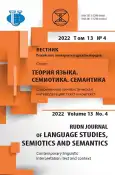Russian Cognitive Terms as a Result of Integration Processes in Scientific Discourse
- Autores: Romanova T.V.1, Kolchina O.N.1
-
Afiliações:
- National Research University Higher School of Economis
- Edição: Volume 13, Nº 4 (2022): CONTEMPORARY LINGUISTIC INTERPRETATION: TEXT AND CONTEXT
- Páginas: 972-988
- Seção: COGNITIVE RESEARCH
- URL: https://journal-vniispk.ru/2313-2299/article/view/323468
- DOI: https://doi.org/10.22363/2313-2299-2022-13-4-972-988
- ID: 323468
Citar
Texto integral
Resumo
The term system of cognitive linguistics is formed from different areas of knowledge and discursive practices. These terms are usually of English origin. But this system also includes Russian-language words of a commonly used nature, which, as a result of systemthesaurus connections with other terms in scientific communication, acquire the status of a cognitive term. The paper discusses the methodological foundations for understanding these integration processes, which is possible only when considering a system of terms as a form of explication of knowledge at the mental and linguistic levels. The nationwide existence of Russian-language words, possible shades of meaning, which allowed such lexemes to move into a group of terms and replenish the cognitive terminological system, are analyzed. The object of analysis is the original Russian lexemes knowledge and consciousness. The subject of analysis is the components of semantics that have become the basis of the terminological meaning of the indicated lexemes; new systemic connections that arose in the words knowledge and consciousness already as in terms of Russian origin when entering the cognitive terminological system: synonymous, antonymic, hyper- and hyponymic, derivational-epidigmatic. Observation of the functioning of the lexemes knowledge and consciousness in popular and scientific discourses, as well as analysis of the interpretation of these terms in scientific discourse, made it possible to clarify the process of terminology of the commonly used vocabulary of the Russian language. The paper presents the results of using corpus and software tools for modeling the functionality of this knowledge format. The collected information is supported by the results of an associative experiment to verify the data sources obtained through automatic processing. The revealed frequency and specificity of the use of cognitive terms on modern material will allow us to draw meaningful conclusions about a qualitatively new state of cognitive terminology.
Palavras-chave
Sobre autores
Tatiana Romanova
National Research University Higher School of Economis
Autor responsável pela correspondência
Email: tvromanova@mail.ru
ORCID ID: 0000-0002-1833-2711
DSc, Associate Professor, Head of the Department of Fundamental and Applied Linguistics, Faculty of Humanities
30, Sormovskoe highway, Nizhny Novgorod, Russian Federation, 603014Olga Kolchina
National Research University Higher School of Economis
Email: on-kolchina@yandex.ru
ORCID ID: 0000-0001-5206-5103
PhD, Associate Professor, Department of Fundamental and Applied Linguistics, Faculty of Humanities
30, Sormovskoe highway, Nizhny Novgorod, Russian Federation, 603014Bibliografia
- Zalevskaya, A.A. (2001). Psycholinguistic approach to the concept problem. In: Methodological problems of cognitive linguistics. Voronezh: Izd-vo Voronezhskogo universiteta. (In Russ.).
- Vendina, T.I. (1998). Russian language picture of the world through the prism of word formation (microcosm). Moscow: Indrik publ. (In Russ.).
- Filatov, V.P. (2016). Knowledge. In: Great Soviet Encyclopedia. URL: https://bigenc.ru/ philosophy/text/1994642 (accessed: 20.02.2022). (In Russ.).
- Karaulov, Yu.N. (2002). Russian Associative Dictionary as a New Linguistic Source and Tool for the Analysis of Language Ability. In: Russian associative dictionary. In 2 vols. Moscow. (In Russ.).
- Prohorov, G.M. (2004). The Old Russian word conscience and modern Russian words conscience and consciousness (Notes of a cultural historian). In: Trudy Otdela drevnerusskoj. Vol. 55. Petersburg: Dmitrij Bulanin. pp. 523–535. (In Russ.).
- Sternin, I.A. (2002). Communicative and cognitive consciousness (With love for language). Moscow — Voronezh. (In Russ.).
- Kornienko, A.F. (2013). Correlation between the concepts of “language”, “thinking” and “consciousness” in psychology and cognitive linguistics. Voprosy Kognitivnoy Lingvistiki, 3, 5–15. (In Russ.).
- Caplin, V.S. (2014). Hypothesis about the nature of consciousness and intelligence based on the analysis of human language and biological evolution. Voprosy Kognitivnoy Lingvistiki, 4, 97–104. (In Russ.).
- Kubryakova, E.S. (1991). About one fragment of the conceptual analysis of the word memory. Logical analysis of language. Сultural concepts. Moscow: Nauka publ. pp. 85–91. (In Russ.).
- Bondarenko, E.V. (2012). ‘Cold’ and ‘warm’ pictures of the world: terminology and ontology. Voprosy Kognitivnoy Lingvistiki, 1, 87–97. (In Russ.).
Arquivos suplementares









